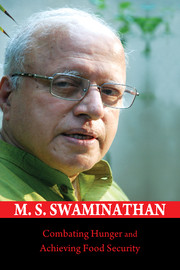Book contents
- Frontmatter
- Contents
- Foreword
- Preface
- Acknowledgements
- Abbreviations
- 1 Genesis and Growth of the Yield Revolution in Wheat
- 2 Our Agricultural Heritage
- 3 Shaping Our Agricultural Destiny
- 4 Thrust on Farm Revival
- 5 Nutri-farm Movement
- 6 Nutrition-sensitive Agriculture
- 7 Food Losses and Food Waste
- 8 Rice in Zero Hunger Challenge
- 9 Monsoon Management
- 10 Importance of Ecological Conservation
- 11 Caring for Ecology and Heritage
- 12 Conserving Biodiversity
- 13 Overcoming Hidden Hunger through Aquaculture
- 14 Biofuels – The Way to Go
- 15 Food Security
- 16 Vigilance for Sustainable Food Security
- 17 Food Security and Social Protection
- 18 Food Security and its Role
- 19 Sustaining the Livestock Revolution
- 20 Challenges in the Year of Science
- 21 Agriculture and Humanism
- 22 Fostering the Science of Science Communication
- 23 Olympic Move for Saving Children
- 24 Youth: The Agents of Change
- 25 Role of Women in Agricultural Production
- 26 Know-how to Do-how
- 27 From Bengal Famine to Right to Food
- 28 Financial Institutions and Fighting Food Inflation
- 29 Public Good Research in Agriculture
- 30 The Future of Indian Agriculture
- Bibliography
18 - Food Security and its Role
Published online by Cambridge University Press: 18 December 2015
- Frontmatter
- Contents
- Foreword
- Preface
- Acknowledgements
- Abbreviations
- 1 Genesis and Growth of the Yield Revolution in Wheat
- 2 Our Agricultural Heritage
- 3 Shaping Our Agricultural Destiny
- 4 Thrust on Farm Revival
- 5 Nutri-farm Movement
- 6 Nutrition-sensitive Agriculture
- 7 Food Losses and Food Waste
- 8 Rice in Zero Hunger Challenge
- 9 Monsoon Management
- 10 Importance of Ecological Conservation
- 11 Caring for Ecology and Heritage
- 12 Conserving Biodiversity
- 13 Overcoming Hidden Hunger through Aquaculture
- 14 Biofuels – The Way to Go
- 15 Food Security
- 16 Vigilance for Sustainable Food Security
- 17 Food Security and Social Protection
- 18 Food Security and its Role
- 19 Sustaining the Livestock Revolution
- 20 Challenges in the Year of Science
- 21 Agriculture and Humanism
- 22 Fostering the Science of Science Communication
- 23 Olympic Move for Saving Children
- 24 Youth: The Agents of Change
- 25 Role of Women in Agricultural Production
- 26 Know-how to Do-how
- 27 From Bengal Famine to Right to Food
- 28 Financial Institutions and Fighting Food Inflation
- 29 Public Good Research in Agriculture
- 30 The Future of Indian Agriculture
- Bibliography
Summary
2013 is one of the most significant years in our agricultural and national history. When India became independent in 1947, we were suffering from acute food shortage, leading to the introduction of food rationing. Later, we started depending on imported food, largely under the PL480 programme of the United States, although our population was only a little over 300 million at that time. In 1966, the year in which Indira Gandhi became the Prime Minister of India, India had to import nearly 10 million tonnes of foodgrains to ward off famine. Mrs Gandhi was worried about India's dependence on imported food for feeding its population, a majority of whom were women and men farmers and farm labourers. Also, she was convinced that an independent foreign policy could be built only on a foundation of food security based on home-grown food. This led to her determination to achieve food self-sufficiency as soon as possible, and also to always maintain substantial grain reserves.
The relationship between self-reliance in food and national sovereignty became evident when several important decisions became possible only because we had built up sufficient foodgrain reserves to meet our needs. Thus, India's assistance to Bangladesh in its liberation struggle in 1971, our help to Vietnam to avoid famine following the unification of the country in 1975, as well as our ability to conduct nuclear implosion tests at Pokhran in 1974 were all possible only because we had become food self-reliant in the early 1970s.
Agriculture is a powerful instrument for national integration. The wheat and rice produced by the Punjab farmers help feed many other parts of the country. Farmers everywhere have a common need, namely, opportunity for assured and remunerative marketing. They are willing to share their knowledge and expertise freely without the thought of intellectual property rights. We should recognize the pivotal role of farmers and farming in fostering the culture of integration.
India has a long heritage of secularism and mutual respect for people in its different regions, a heritage which, unfortunately, is now under threat. In 1998, while awarding me an Honorary Doctorate of the University of Jerusalem, the President of the University told the audience: ‘Professor Swaminathan comes from a country which is the only one which has never persecuted Jews during the 2000 years of our history.’ I felt very proud when I heard these remarks.
- Type
- Chapter
- Information
- Combating Hunger and Achieving Food Security , pp. 95 - 98Publisher: Cambridge University PressPrint publication year: 2016



